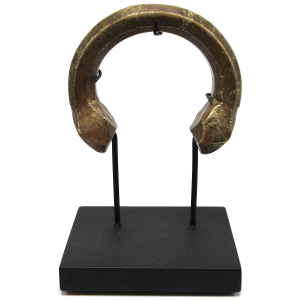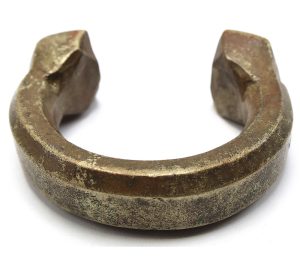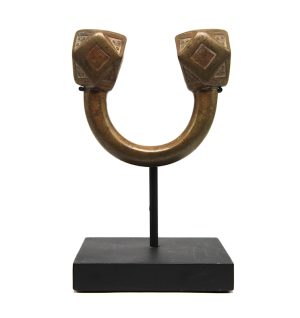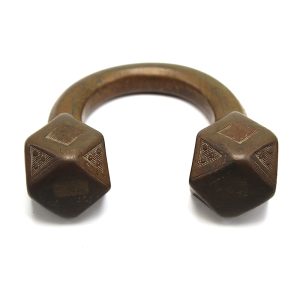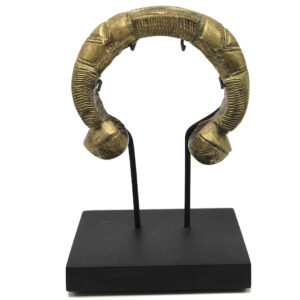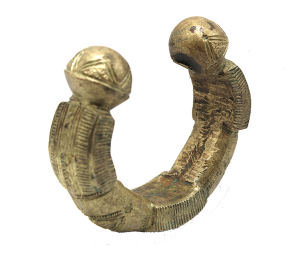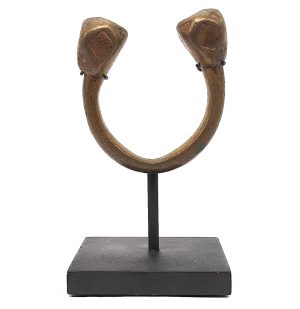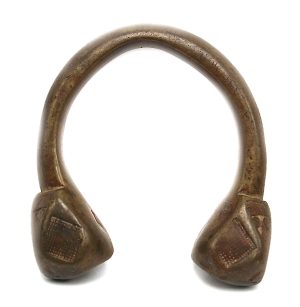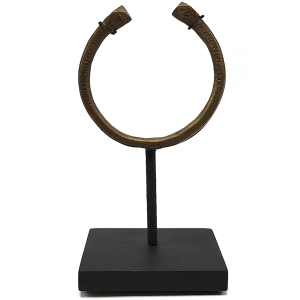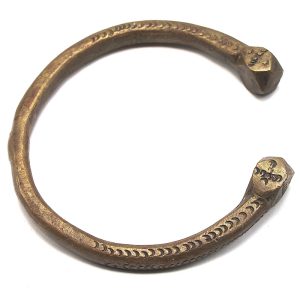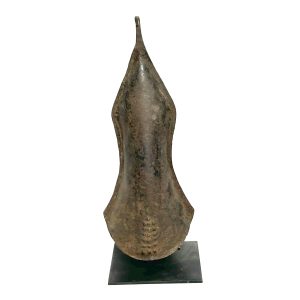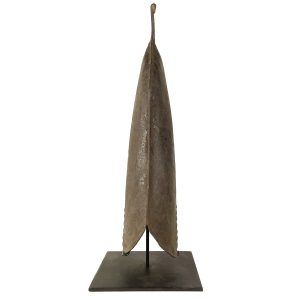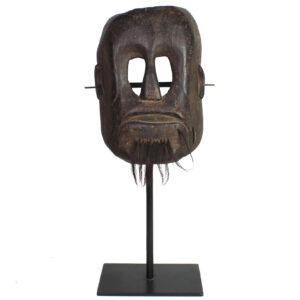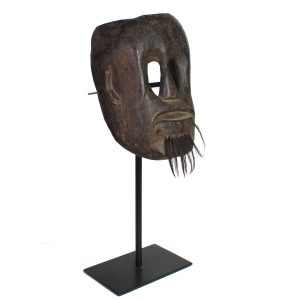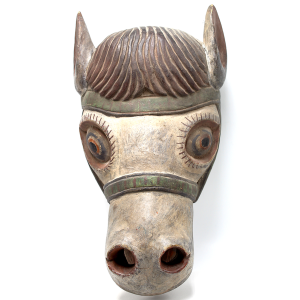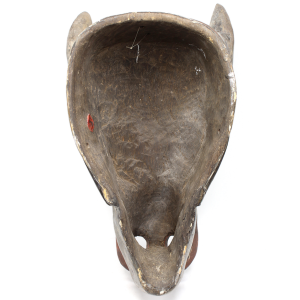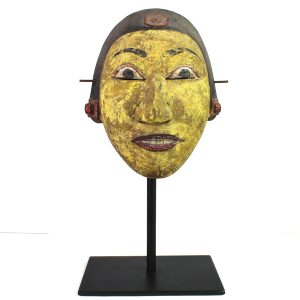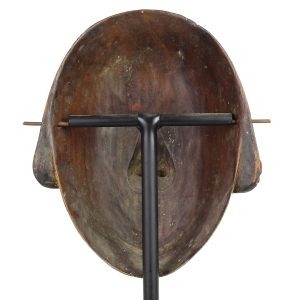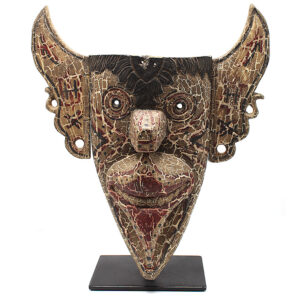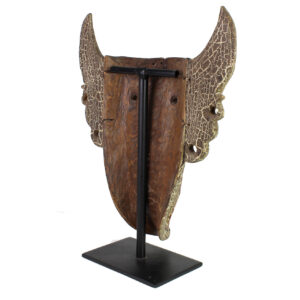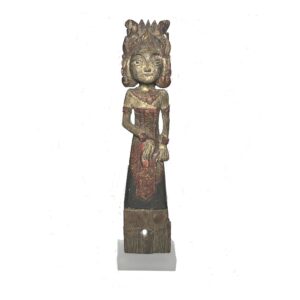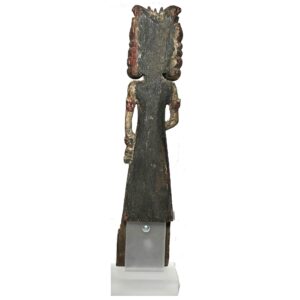Showing 13–24 of 32 results
-
Sale!


$295.00 Original price was: $295.00.$225.00Current price is: $225.00.
H: 3.375” W: 3.25” Thick: 1.25” Circum: 5.75” | FREE SHIPPING IN CONTINENTAL u.s.
Large C-shaped Tuareg manilla made from sand moulds, has massive finials with 12 facets with detailed hand-etched and hammered designs including raised circles.
-
Sale!


$325.00 Original price was: $325.00.$295.00Current price is: $295.00.
Ht: 4″ W: 4.6525″ Thick: 1.5″ Circum: 10.5″ | FREE SHIPPING WITHIN CONTINENTAL U.S.
Antique horseshoe shaped Tuareg “King” manilla, magnificent metalwork, 10 faceted flat finial ends with traditional etched and hammered geometric designs, excellent condition, fine patina.
-
Sale!


$295.00 Original price was: $295.00.$225.00Current price is: $225.00.
H: 3.125″ W: 3.125″ D: 0.75″ | FREE SHIPPING WITHIN CONTINENTAL US.
Tuareg horseshoe-shaped manilla with bold hammered and incised decorative motifs unique to individual Tuareg tribes Divided in sections, with etched designs, circular cutouts, ending knot finials. .
-
Sale!


$285.00 Original price was: $285.00.$225.00Current price is: $225.00.
Bracelet H: 3.875” W: 3.5” Thick: 1.125” | FREE SHIPPING WITHIN CONTINENTAL U.S.
Tuareg horseshoe shape manilla with bulbous rounded faceted ends, hand hammered fine details.
-
Sale!


$195.00 Original price was: $195.00.$125.00Current price is: $125.00.
H: 3.5” W: 3.625” Thick: 0.50” Circum. 10.125” | FREE SHIPPING WITHIN CONTINENTAL U.S.
Finely fashioned Tuareg slim circular-shaped manilla bracelet/anklet, hand incised striated decorations, and faceted rounded beads at the open hoof-shaped terminals ends.
-


$395.00
H: 21″ W: 8″ D: 4.75″ | FOR SHIPPING INFORMATION CONTACT US AT 213-568-3030
This traditional African hammered iron gong is elegantly shaped like a flaring bell. Heat riveted, a forging process joining two metal pieces together, it was made by Congolese tribal people. Made with 5 parallel lines of 5 decorative round bulges on both sides, it was often held using a raffia handle and beaten using sticks covered with rubber at its end. Originally a ritual instrument, they were also beaten to call members of special restricted societies to meetings and were a symbol of wealth, prestige, and influence.
-
Sale!


$1,750.00 Original price was: $1,750.00.$1,350.00Current price is: $1,350.00.
H: 20.75″ W: 8″ | CALL 213-568-3030 OR EMAIL [email protected] FOR SHIPPING
Rare Timor ancestor mask for ritual offerings to honor the departed and provide space during village visits, repel evil spirits. Featured in 2002 Spiderman movie in collection of the Green Goblin.
-
Sale!


$325.00 Original price was: $325.00.$210.00Current price is: $210.00.
H: 13.5″ W: 7.5″ D: 5″ | FREE SHIPPING WITHIN CONTINENTAL U.S.
Used in ritual Cham Dances, this whimsical and colorful mask emphasizes the horses playful character, alertness and strength with large eyes, painted lashes, wide raised lids, flaring nostrils, open mouth and pointed ears framed by beautifully carved rows of black hair.
-
Sale!


$675.00 Original price was: $675.00.$525.00Current price is: $525.00.
Ht: 15.5” W: 8” D: 5” | CALL 213-568-3030 OR EMAIL [email protected] FOR SHIPPING
Dayu mask of Balinese high-caste female Hindu Brahman, beautiful decorative piece on a museum quality metal stand.
-


$485.00
H: W: D: Ht: 14.75″ W:12.125″ | FREE SHIPPING WITHIN CONTINENTAL U.S.
-
Sale!


$395.00 Original price was: $395.00.$325.00Current price is: $325.00.
Ht: 14.5” W: 3.5” D: 2.25” | FREE SHIPPING WITHIN CONTINENTAL U.S
Rare vintage carving dedicated to Dewi Sri, Balinese Goddess of Rice. was probably made for a home shrine or small rice field temple . Hole near the bottom indicates it may have been part of a larger decorative scheme.
-


$675.00
The religion of the ethnic Dayak (Dyak) people of Kalimantan (Borneo), Indonesia is a mix of animism, shamanism and ancestor worship. Their word hudoq describes three different things: it describes the pests that can destroy the rice harvest on which their survival depends; the name of the huge yearly Dyak planting celebration and the name…
End of content
End of content

